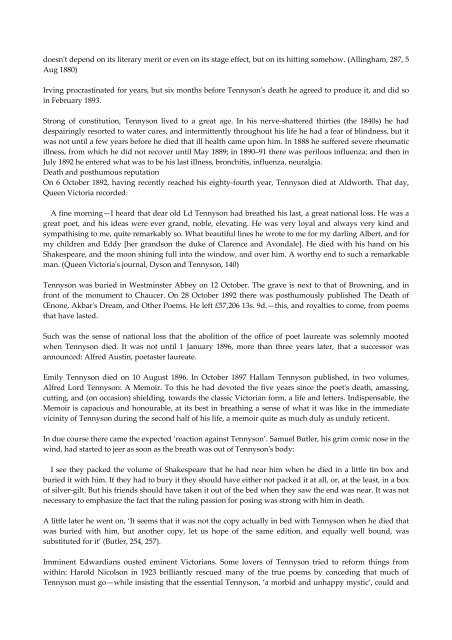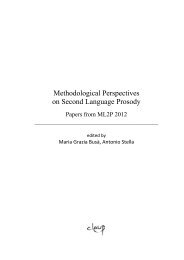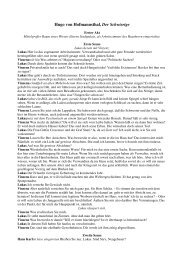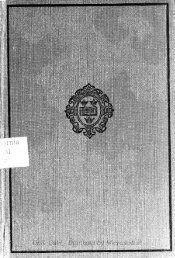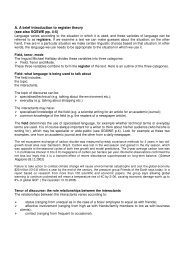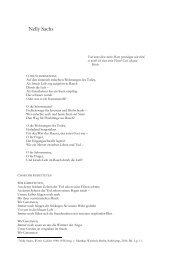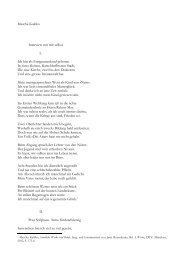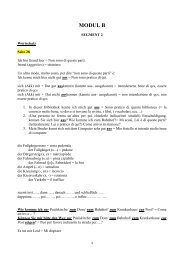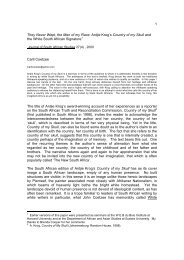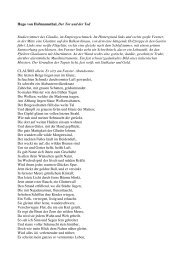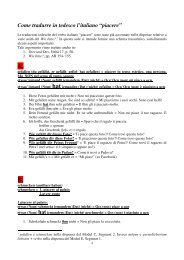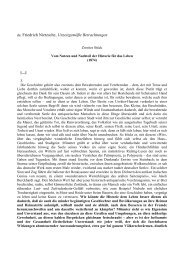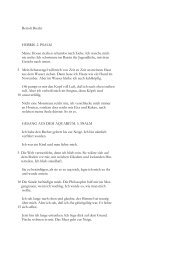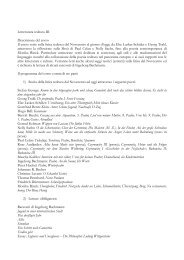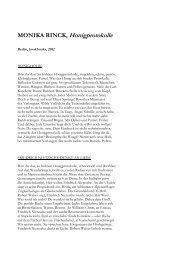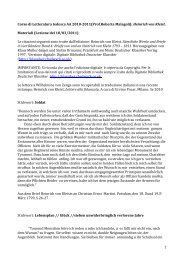The lives of the poets from The Dictionary of National Biography ...
The lives of the poets from The Dictionary of National Biography ...
The lives of the poets from The Dictionary of National Biography ...
You also want an ePaper? Increase the reach of your titles
YUMPU automatically turns print PDFs into web optimized ePapers that Google loves.
doesnʹt depend on its literary merit or even on its stage effect, but on its hitting somehow. (Allingham, 287, 5<br />
Aug 1880)<br />
Irving procrastinated for years, but six months before Tennysonʹs death he agreed to produce it, and did so<br />
in February 1893.<br />
Strong <strong>of</strong> constitution, Tennyson lived to a great age. In his nerve‐shattered thirties (<strong>the</strong> 1840s) he had<br />
despairingly resorted to water cures, and intermittently throughout his life he had a fear <strong>of</strong> blindness, but it<br />
was not until a few years before he died that ill health came upon him. In 1888 he suffered severe rheumatic<br />
illness, <strong>from</strong> which he did not recover until May 1889; in 1890–91 <strong>the</strong>re was perilous influenza; and <strong>the</strong>n in<br />
July 1892 he entered what was to be his last illness, bronchitis, influenza, neuralgia.<br />
Death and posthumous reputation<br />
On 6 October 1892, having recently reached his eighty‐fourth year, Tennyson died at Aldworth. That day,<br />
Queen Victoria recorded:<br />
A fine morning—I heard that dear old Ld Tennyson had brea<strong>the</strong>d his last, a great national loss. He was a<br />
great poet, and his ideas were ever grand, noble, elevating. He was very loyal and always very kind and<br />
sympathising to me, quite remarkably so. What beautiful lines he wrote to me for my darling Albert, and for<br />
my children and Eddy [her grandson <strong>the</strong> duke <strong>of</strong> Clarence and Avondale]. He died with his hand on his<br />
Shakespeare, and <strong>the</strong> moon shining full into <strong>the</strong> window, and over him. A worthy end to such a remarkable<br />
man. (Queen Victoriaʹs journal, Dyson and Tennyson, 140)<br />
Tennyson was buried in Westminster Abbey on 12 October. <strong>The</strong> grave is next to that <strong>of</strong> Browning, and in<br />
front <strong>of</strong> <strong>the</strong> monument to Chaucer. On 28 October 1892 <strong>the</strong>re was posthumously published <strong>The</strong> Death <strong>of</strong><br />
Œnone, Akbarʹs Dream, and O<strong>the</strong>r Poems. He left £57,206 13s. 9d.—this, and royalties to come, <strong>from</strong> poems<br />
that have lasted.<br />
Such was <strong>the</strong> sense <strong>of</strong> national loss that <strong>the</strong> abolition <strong>of</strong> <strong>the</strong> <strong>of</strong>fice <strong>of</strong> poet laureate was solemnly mooted<br />
when Tennyson died. It was not until 1 January 1896, more than three years later, that a successor was<br />
announced: Alfred Austin, poetaster laureate.<br />
Emily Tennyson died on 10 August 1896. In October 1897 Hallam Tennyson published, in two volumes,<br />
Alfred Lord Tennyson: A Memoir. To this he had devoted <strong>the</strong> five years since <strong>the</strong> poetʹs death, amassing,<br />
cutting, and (on occasion) shielding, towards <strong>the</strong> classic Victorian form, a life and letters. Indispensable, <strong>the</strong><br />
Memoir is capacious and honourable, at its best in breathing a sense <strong>of</strong> what it was like in <strong>the</strong> immediate<br />
vicinity <strong>of</strong> Tennyson during <strong>the</strong> second half <strong>of</strong> his life, a memoir quite as much duly as unduly reticent.<br />
In due course <strong>the</strong>re came <strong>the</strong> expected ‘reaction against Tennyson’. Samuel Butler, his grim comic nose in <strong>the</strong><br />
wind, had started to jeer as soon as <strong>the</strong> breath was out <strong>of</strong> Tennysonʹs body:<br />
I see <strong>the</strong>y packed <strong>the</strong> volume <strong>of</strong> Shakespeare that he had near him when he died in a little tin box and<br />
buried it with him. If <strong>the</strong>y had to bury it <strong>the</strong>y should have ei<strong>the</strong>r not packed it at all, or, at <strong>the</strong> least, in a box<br />
<strong>of</strong> silver‐gilt. But his friends should have taken it out <strong>of</strong> <strong>the</strong> bed when <strong>the</strong>y saw <strong>the</strong> end was near. It was not<br />
necessary to emphasize <strong>the</strong> fact that <strong>the</strong> ruling passion for posing was strong with him in death.<br />
A little later he went on, ‘It seems that it was not <strong>the</strong> copy actually in bed with Tennyson when he died that<br />
was buried with him, but ano<strong>the</strong>r copy, let us hope <strong>of</strong> <strong>the</strong> same edition, and equally well bound, was<br />
substituted for it’ (Butler, 254, 257).<br />
Imminent Edwardians ousted eminent Victorians. Some lovers <strong>of</strong> Tennyson tried to reform things <strong>from</strong><br />
within: Harold Nicolson in 1923 brilliantly rescued many <strong>of</strong> <strong>the</strong> true poems by conceding that much <strong>of</strong><br />
Tennyson must go—while insisting that <strong>the</strong> essential Tennyson, ‘a morbid and unhappy mystic’, could and


